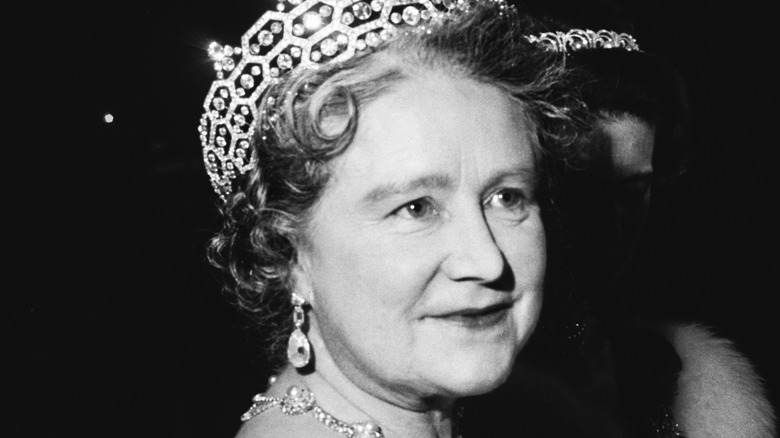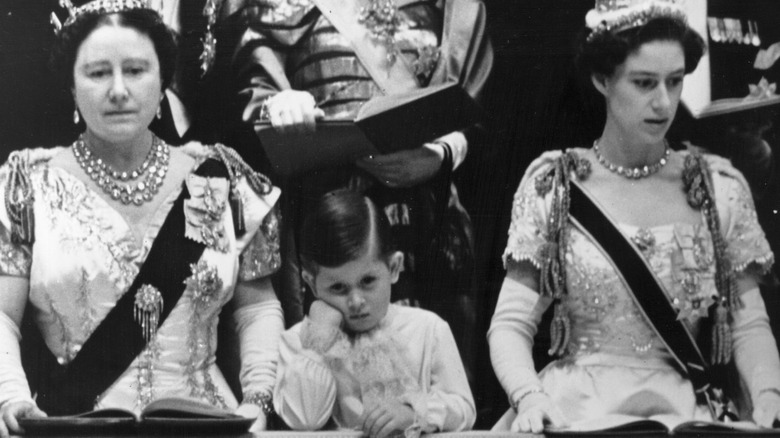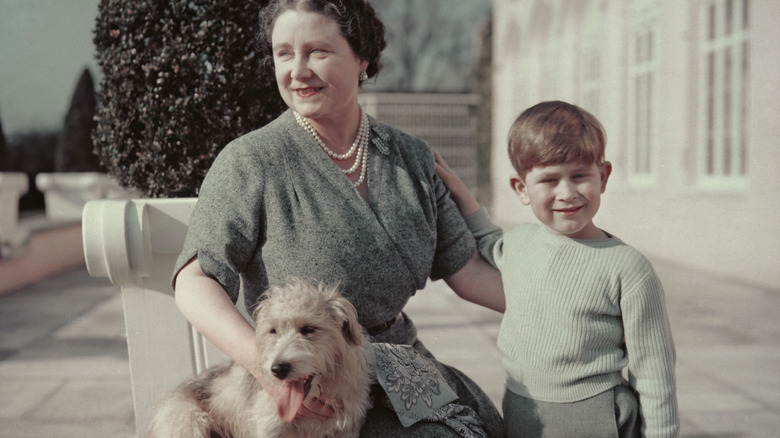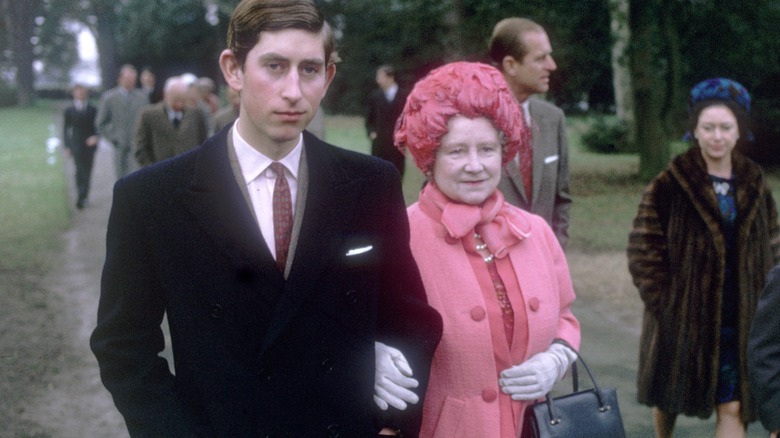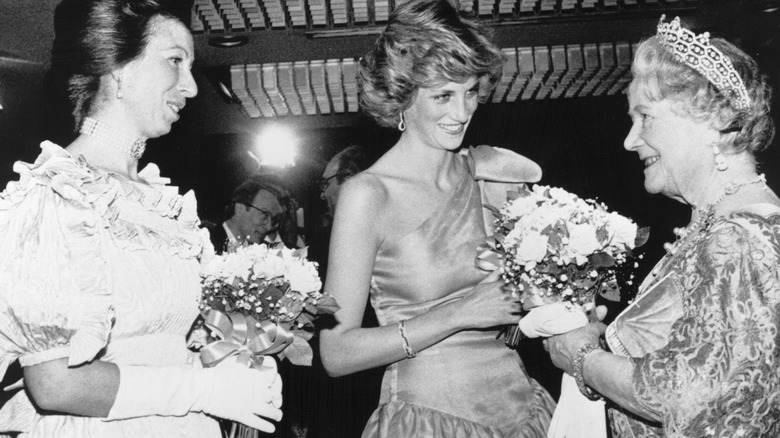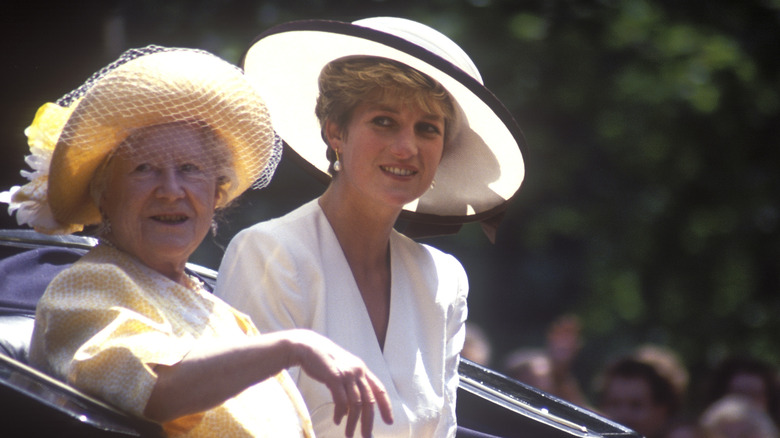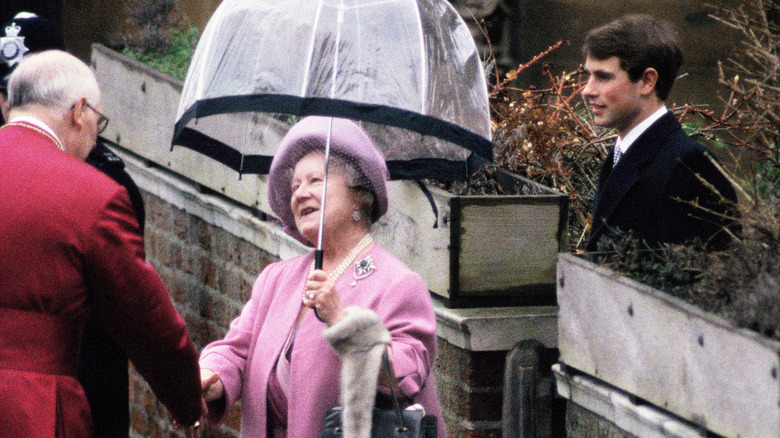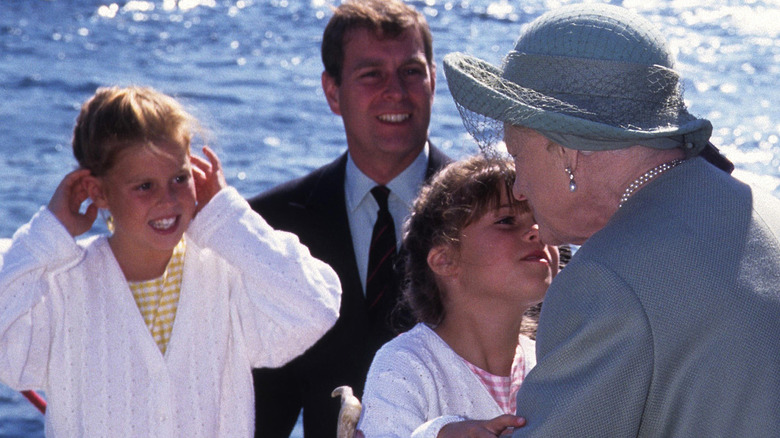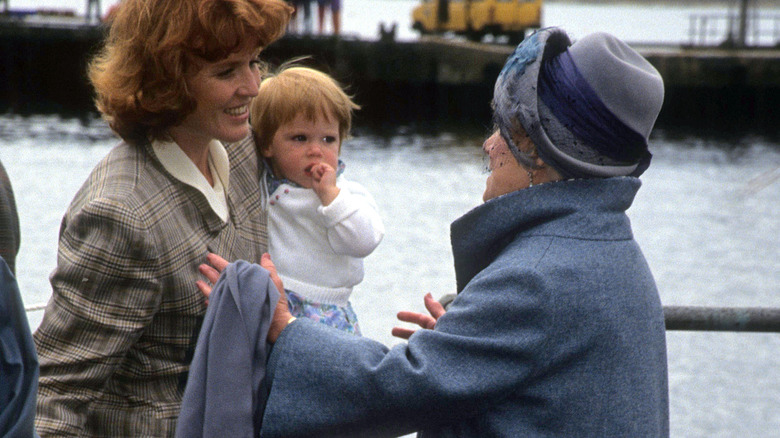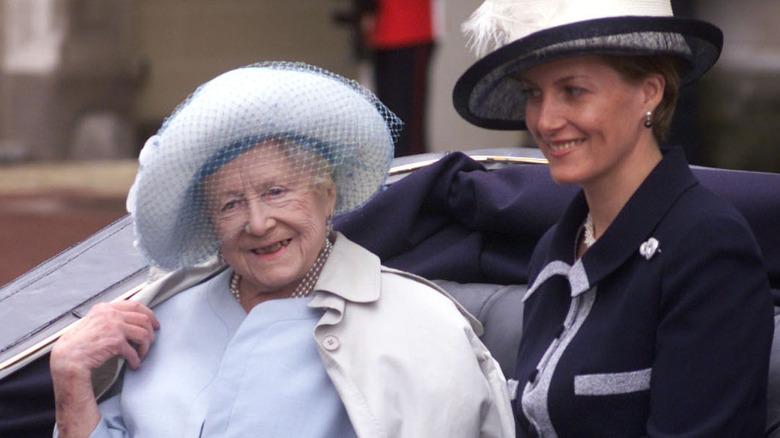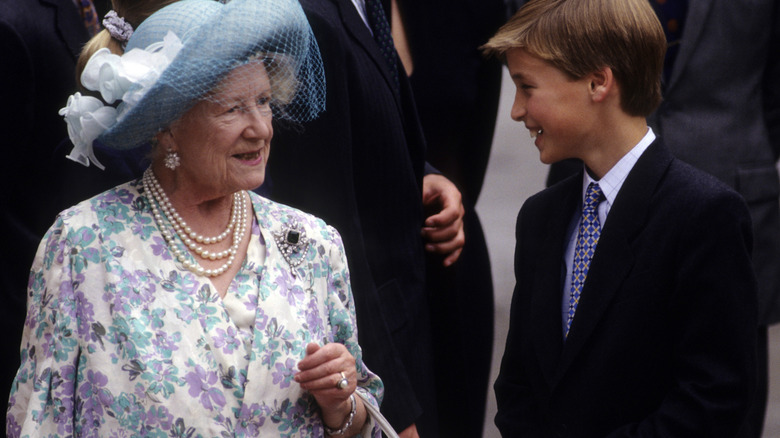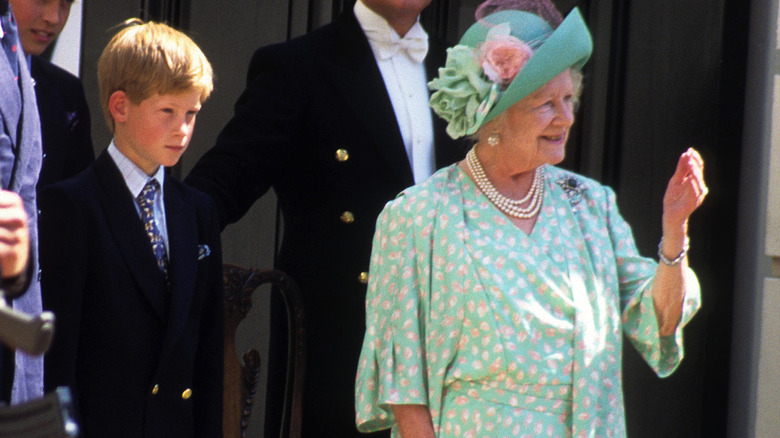Inside The Queen Mother's Relationship With Her Grandchildren
Queen Elizabeth, the Queen Mother had an undeniable influence on the British royal family. She was crowned queen consort in 1937 following one of the largest crises in the history of the monarchy. At the time, Britain was reeling from King Edward VIII's scandalous decision to abdicate the throne in order to marry the American divorcée, Wallis Simpson. Indeed, Edward's choice to step away from his birthright put the whole idea of the crown into question. Of the situation, one of the king's contemporaries wrote: "We hoped that the young king would be our leader ... he has chosen otherwise" (via The Guardian).
In the midst of this tense situation, Elizabeth defended the crown from claims of illegitimacy. This was most evident in her decision to exile Edward and Wallis from Britain. After all, as Elizabeth once told a Daily Mail correspondent who asked why the couple was not welcome back, "A country can only have one king at a time." Beyond the issue of Edward and Wallis, the Queen Mother was also integral in restoring the monarchy's image in the eyes of the British people. This was especially true during World War II when Elizabeth refused to leave the London area, even after bombs were dropped on Buckingham Palace.
Because of these efforts, Elizabeth encouraged her grandchildren and their partners to protect the monarchy. Over the years, she encouraged King Charles III to stay with Princess Diana, supported Sophie Rhys-Jones' charitable interests, and even ignored Prince Harry.
The Queen Mother had a soft spot for King Charles
When King Charles III was growing up, he did not have a lot of contact with his parents. Even before his mother, Queen Elizabeth II, was crowned the Head of State, Charles would go weeks or even months without seeing her. After all, when the future king was just one, Elizabeth joined Prince Philip in Malta, where they spent the Christmas holiday away from their young son. Later, when Charles was only five, the queen and prince consort embarked on a tour of the Commonwealth that lasted a full six months. Because of this distance between Charles and his parents, the young prince's first word was not "mama" or "dada" but instead "nana" — a nickname for his nanny.
Luckily, however, Charles was not totally alone. Even as his parents traveled the world, his grandmother, Queen Elizabeth, the Queen Mother, looked out for him. As noted in historian Gareth Russell's book, "Do Let's Have Another Drink!: The Dry Wit and Fizzy Life of Queen Elizabeth, The Queen Mother," (via People), the elder Elizabeth supported Charles during his parents' absences: "In some ways, the queen mother was a mother figure to Charles just because the queen became queen when Charles was so young." Apparently, the time that the young prince spent with his grandmother was lighthearted and full of support. As Russell explained in his book, "They had a great sense of humor, and she always encouraged him."
She encouraged Charles to get involved in the arts
Perhaps because she cared so deeply for King Charles III, Queen Elizabeth, the Queen Mother was a very supportive figure in the eyes of the future king. Indeed, some sources indicate that the elder Elizabeth did everything in her power to nurture Charles' development. As Gareth Russell wrote (via People), Charles received a lot of encouragement from his grandmother: "Apparently, [Elizabeth] always said, 'Well done' to people. I think she would say, 'Well done' to King Charles, because she absolutely adored him, and she believed in things being done in a certain traditional way."
This was especially evident in Elizabeth's approach toward Charles' artistic interests. Speaking on the "Royally Obsessed" podcast (via Express), co-host, Roberta Fiorito, explained that the Queen Mother allowed Charles to explore that side of his personality when his parents were away: "It seems like he felt that the queen and Prince Philip were a little bit absent from his childhood, but he did have someone who really indulged his artistic side in the queen mother."
According to Fiorito, Elizabeth allowed her grandson to fall in love with art: "She was really supportive of all that and we know now how that played out. He recites Shakespeare on the fly and loves painting and watercolors. Yeah, so I think that came from her."
The Queen Mother also might have had some power over Charles
Queen Elizabeth, the Queen Mother was not royal by birth. In fact, it was only because she married the future, King George VI, that Elizabeth was crowned queen consort in 1937. Later, following the 1953 coronation of her daughter, Queen Elizabeth II, the elder Elizabeth became known as the Queen Mother. As a result, she did not have much power in an official capacity. But that didn't stop her from using her infamous charm to influence the powerful people in her family.
During George's time as king of England, Elizabeth played a major role in shaping his opinions. Private letters published in William Shawcross' book, "Queen Elizabeth: The Official Biography of The Queen Mother" (via Express), reveal that Elizabeth had so much influence over her husband that she could flip his stance on issues in a matter of hours. One letter, written by the historian, Kenneth Rose, recalled, "The king would have a discussion with his private secretary, Sir Alan Lascelles, and instruct him to do one thing, only for the king to come back the next morning and change his mind. The strong inference was that the queen mother had persuaded him to change his mind."
Interestingly, it has been said that the Queen Mother once hoped to have a similar arrangement with King Charles III. According to the 2017 documentary, "The Royal House of Windsor" (via Express), Elizabeth wished to influence Charles just as she had George.
The Queen Mother and Princess Anne shared a similar vision about royal newcomers
Although Queen Elizabeth, the Queen Mother, had a close relationship with King Charles III, he was not the only one of her grandchildren that she loved. The Queen Mother was said to be close with Princess Anne, as well. Apparently, the two particularly shared an opinion as to who was suitable for royal life — and who was not. One member of the royal family who neither Elizabeth nor Anne found especially suitable was the ill-fated Princess Diana. In spite of Diana's blue-blooded background, both women worried that she would somehow degrade the image of the monarchy.
Anne, in particular, was concerned that Diana's tumultuous relationship with the press would reflect poorly on the crown. As royal expert, Steve Wood, shared in the documentary, "The Real Princess Anne" (via Express), Anne "was extremely annoyed when Diana became centre stage and then Fergie became centre stage for a while." The reason for the princess' frustration apparently pertained to the way that Diana and Sarah Ferguson portrayed the royal family to the world. Wood said that Anne "viewed them both as lessening the stature of the Royal Family. Too much tabloid for her."
Fascinatingly, the Queen Mother seemed to share Anne's concerns. Speaking in the documentary, "When the Spencers Met the Monarchy" (via Express), historian, Piers Brendon, explained, "I think the queen mother probably saw Diana as another Mrs. Simpson. Somebody who might conceivably pull the monarchy down."
She had a strained relationship with Princess Diana
Because Queen Elizabeth, the Queen Mother didn't necessarily view Princess Diana as a suitable royal wife, her relationship with her granddaughter-in-law was hardly a positive one. In the leaked tape scandal that later became known as Squidgygate, Diana was recorded telling her friend, Jame Gilbey, that she didn't feel comfortable around the Queen Mother.
Apparently, Elizabeth would occasionally send unnerving glances in Diana's direction, leaving the princess quaking. Diana told Gilbey, "His grandmother is always looking at me with a strange look in her eyes. 'It's not hatred; it's sort of interest and pity mixed in one. I am not quite sure. I don't understand it. Every time I look, she's looking at me, then looks away and smiles..." (via Newsweek).
Some of the tension that surfaced between Elizabeth and Diana likely pertained to the princess' rocky marriage to then-Prince Charles. While Diana clearly felt wronged by Charles' affair with Camilla, the elder Elizabeth did not see a problem with her grandson's dalliances. In the documentary, "When the Spencers Met the Monarchy" (via Express), royal expert, Jennie Bond, opined that Elizabeth would have wanted Diana to maintain keep a stiff upper lip throughout Charles' affairs. "The Queen Mother probably would have felt that Diana should just put up with it and get on with it. That would have been her attitude," Bond shared. After all, Elizabeth did not view divorce as an appropriate path for a royal.
The Queen Mother was horrified by Edward's public behavior
Princess Diana was not the only royal who angered Queen Elizabeth, the Queen Mother. In fact, the Queen Mother was known to find fault in her own grandchildren, especially when they broke protocol. This was certainly true for Prince Edward, who massively humiliated the entire British royal family in 1987.
At the time, Edward was so desperate to enter the television industry that he organized a competition gameshow meant to raise money for charity. The program, titled "It's a Royal Knockout," filmed senior royals dressed in kitschy medieval attire as they performed ridiculous physical tasks. While the event did collect funds for good causes, it also embarrassed the crown. Indeed, the show portrayed the royal family as nothing more than a clown show. As royal expert, Angela Levin, shared in the documentary, "Scandals at the Palace" (via Express), Edward's TV program "was quite dangerous for the royal family in a way. You think, am I giving my taxpayer's money for this? It's nonsense!"
The way that "It's a Royal Knockout" threatened the legitimacy of the monarchy was not lost on the Queen Mother, who responded terribly to the whole ordeal. In the same documentary, royal commentator, Emily Andrews, explained, "The Queen Mother in particular was incensed. In one fell swoop, Edward had managed to set them up to be complete laughing stocks. And she, having worked so hard to reposition the family."
The Queen Mother had a complicated relationship with Prince Andrew
Queen Elizabeth, the Queen Mother did not solely blame Prince Edward for the disaster that was "It's a Royal Knockout." She also was said to be furious with Prince Andrew for participating in the humiliating TV program. In his 1993 book, "Charles: The Untold Story" (via Express), royal expert, Ross Benson, claimed that the Queen Mother spoke to Andrew shortly after the show aired. Apparently, she told him that the game show "reduced the royals to the ranks of second-rate comedians" — a situation which she believed could threaten the image of the crown. As Benson wrote, "The queen mother's face was white with rage and she reminded her grandchild of the abdication and the danger that had posed to the monarchy."
Despite this tension between Andrew and his grandmother, all was not lost in that relationship. The elder Elizabeth was said to support Andrew in other endeavors, including his unusual relationship with Sarah Ferguson. Somewhat controversially, Andrew and Sarah have continued to live together and even share assets in the decades following their 1996 divorce. And, apparently, the Queen Mother supported this arrangement.
As her former equerry, Major Colin Burgess, once wrote in the Daily Mail (via Express), "Andrew and his wife, Sarah Ferguson, had announced their separation, but they kept seeing each other on and off for ages afterwards. And, I remember the queen mum sighing and saying to me: 'You know, Andrew does love her so.'"
She preferred Sarah Ferguson to Princess Diana
Queen Elizabeth II once famously called 1992 the "annus horribilis," which, according to Smithsonian Magazine, is Latin for the "horrible year." Although Queen Elizabeth, the Queen Mother remained silent on the matter, it is likely that she agreed with her daughter. After all, 1992 marked a tense moment for the British monarchy, as it was during this year that then-Prince Charles separated from his wife, Princess Diana. As if that weren't news enough, the Wales' break-up was shortly followed by the public separation of Prince Andrew and Sarah Ferguson.
Although the elder Elizabeth was not known to approve of divorce, she treated Diana and Sarah very differently following their respective exits from the royal family. When it came to Diana, the Queen Mother liked to pretend she didn't exist. As her equerry, Major Colin Burgess, explained in a piece for the Daily Mail (via Express), "Once Diana split from Charles, she was very much persona non grata, and I never again heard her name mentioned by, or in front of, the Queen Mum."
Meanwhile, Burgess claimed that the Queen Mother continued to support Sarah — no matter how embarrassing her behavior was. The equerry wrote, "You could see that regardless of everything Sarah Ferguson had done, despite all the shame she had brought on the royals with her gaffes, the queen mother was still quite fond of her because of the joy she brought to Andrew."
Sophie of Edinburgh and the Queen Mother bonded over shared causes
Queen Elizabeth, the Queen Mother may have adored Sarah Ferguson, but she also loved another one of her granddaughters-in-law — Sophie, Duchess of Edinburgh. The reason for Elizabeth's positive relationship with Sophie pertained largely to their shared charitable interests. Speaking to the Express, royal jewelry expert, Claire Beatson, emphasized the way that Elizabeth and Sophie bonded over their work with disadvantaged children: "I believe it is Sophie's charity work, particularly with underprivileged and disabled children (The Wessex Trust) that is most likely the connection between her and the Queen Mother, who also set up a charity that makes clothes for underprivileged families (Queen Mother's Clothing Guild)."
Perhaps, as a result of this unique connection, Elizabeth gave Sophie a special brooch, which she herself had received as a present from her husband, King George VI, in 1930. According to Beatson's interview with the Express, the piece includes "round brilliant and baguette diamonds to create a flowing petal shape that can then be joined at the stems to create a bow shape." This gift, which Sophie received following her wedding to Prince Edward in 1999, is thought to represent the queen mother's positive view of her granddaughter-in-law. In Beatson's words, the brooch stands as a "clear sign of approval for the wife of [the queen mother's] youngest grandson."
She doted on Prince William
As the heir to the British throne, Prince William inevitably drew the interest of Queen Elizabeth, the Queen Mother. Despite the age gap between herself and her great-grandson, Elizabeth made a tremendous effort to get to know William. Unfortunately, though, as revealed in the documentary, "Prince Harry: The Troubled Prince" (via Newsweek), this interest in William bordered on favoritism.
Royal biographer, Angela Levin, even told filmmakers, "The late queen mother would always invite Prince William over for tea and talk to him about his future and not invite Prince Harry." Princess Diana's personal friend, Richard Kay, agreed with this assessment, sharing, "The Queen Mother always made sure Prince William was seated in a prominent seat next to her and Harry never was."
While this dynamic must have been a bit odd, it also allowed William to develop a close relationship with his great-grandmother. The pair were such fast friends that, when William went off to university, he would tell Elizabeth about all the parties he would go to. The Guardian once quoted him saying, "She loved to hear about all my friends and all they got up to. And she loved to hear about how much trouble I got into at school." In fact, Elizabeth enjoyed hearing about William's antics so much that she wanted to join in the fun. The prince told the press that she once jokingly told him, "Any good parties, invite me down."
The Queen Mother largely ignored Prince Harry
Prince William grew close to Queen Elizabeth, the Queen Mother, but Prince Harry had a totally different experience. Elizabeth was not as interested in spending time with Harry as she was with William. After all, William was the heir to the throne, and Harry was just the spare. According to at least one royal expert, this discrepancy bothered both Princess Diana and King Charles III.
As historian, Gareth Russell, wrote in his book, "Do Let's Have Another Drink!: The Dry Wit and Fizzy Life of Queen Elizabeth, The Queen Mother" (via Newsweek), Diana "also apparently felt that sometimes the queen mother, to an extent she made obvious, preferred William to Harry ... until Diana confronted her about it." Charles agreed with his then-wife on this issue, as he wanted William and Harry to "share things in their early years."
Ultimately, the Queen Mother tried to make up for any of the preferential treatment that she gave William. When she passed away in 2002, Elizabeth left most of her £14 million fortune to Harry. Indeed, she reportedly felt that the elder son would always have more financial power than the younger one. Thus, she used her personal fortune to help even the balance.
